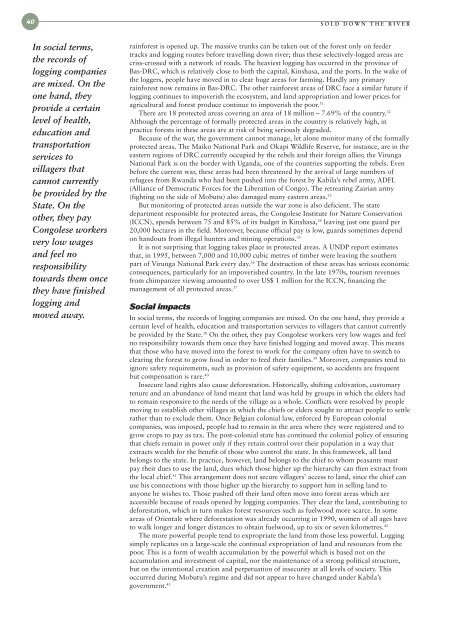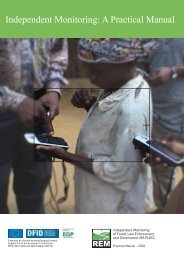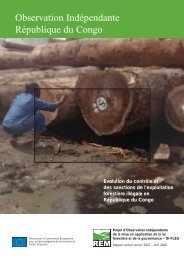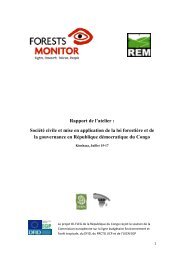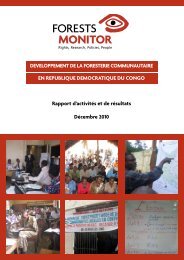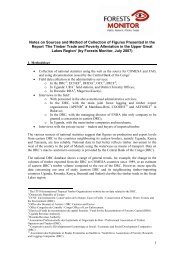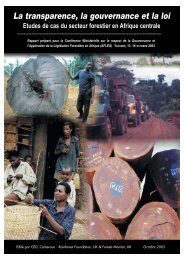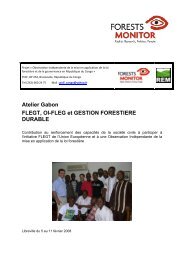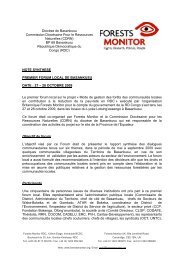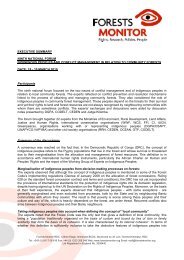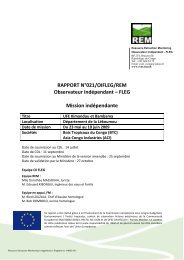Sold down the river - Salva le Foreste
Sold down the river - Salva le Foreste
Sold down the river - Salva le Foreste
Create successful ePaper yourself
Turn your PDF publications into a flip-book with our unique Google optimized e-Paper software.
40SOLD DOWN THE RIVERIn social terms,<strong>the</strong> records oflogging companiesare mixed. On <strong>the</strong>one hand, <strong>the</strong>yprovide a certain<strong>le</strong>vel of health,education andtransportationservices tovillagers thatcannot currentlybe provided by <strong>the</strong>State. On <strong>the</strong>o<strong>the</strong>r, <strong>the</strong>y payCongo<strong>le</strong>se workersvery low wagesand feel noresponsibilitytowards <strong>the</strong>m once<strong>the</strong>y have finishedlogging andmoved away.rainforest is opened up. The massive trunks can be taken out of <strong>the</strong> forest only on feedertracks and logging routes before travelling <strong>down</strong> <strong>river</strong>; thus <strong>the</strong>se se<strong>le</strong>ctively-logged areas arecriss-crossed with a network of roads. The heaviest logging has occurred in <strong>the</strong> province ofBas-DRC, which is relatively close to both <strong>the</strong> capital, Kinshasa, and <strong>the</strong> ports. In <strong>the</strong> wake of<strong>the</strong> loggers, peop<strong>le</strong> have moved in to c<strong>le</strong>ar huge areas for farming. Hardly any primaryrainforest now remains in Bas-DRC. The o<strong>the</strong>r rainforest areas of DRC face a similar future iflogging continues to impoverish <strong>the</strong> ecosystem, and land appropriation and lower prices foragricultural and forest produce continue to impoverish <strong>the</strong> poor. 31There are 18 protected areas covering an area of 18 million – 7.69% of <strong>the</strong> country. 32Although <strong>the</strong> percentage of formally protected areas in <strong>the</strong> country is relatively high, inpractice forests in <strong>the</strong>se areas are at risk of being seriously degraded.Because of <strong>the</strong> war, <strong>the</strong> government cannot manage, <strong>le</strong>t alone monitor many of <strong>the</strong> formallyprotected areas. The Maiko National Park and Okapi Wildlife Reserve, for instance, are in <strong>the</strong>eastern regions of DRC currently occupied by <strong>the</strong> rebels and <strong>the</strong>ir foreign allies; <strong>the</strong> VirungaNational Park is on <strong>the</strong> border with Uganda, one of <strong>the</strong> countries supporting <strong>the</strong> rebels. Evenbefore <strong>the</strong> current war, <strong>the</strong>se areas had been threatened by <strong>the</strong> arrival of large numbers ofrefugees from Rwanda who had been pushed into <strong>the</strong> forest by Kabila’s rebel army, ADFL(Alliance of Democratic Forces for <strong>the</strong> Liberation of Congo). The retreating Zairian army(fighting on <strong>the</strong> side of Mobutu) also damaged many eastern areas. 33But monitoring of protected areas outside <strong>the</strong> war zone is also deficient. The statedepartment responsib<strong>le</strong> for protected areas, <strong>the</strong> Congo<strong>le</strong>se Institute for Nature Conservation(ICCN), spends between 75 and 85% of its budget in Kinshasa, 34 <strong>le</strong>aving just one guard per20,000 hectares in <strong>the</strong> field. Moreover, because official pay is low, guards sometimes dependon handouts from il<strong>le</strong>gal hunters and mining operations. 35It is not surprising that logging takes place in protected areas. A UNDP report estimatesthat, in 1995, between 7,000 and 10,000 cubic metres of timber were <strong>le</strong>aving <strong>the</strong> sou<strong>the</strong>rnpart of Virunga National Park every day. 36 The destruction of <strong>the</strong>se areas has serious economicconsequences, particularly for an impoverished country. In <strong>the</strong> late 1970s, tourism revenuesfrom chimpanzee viewing amounted to over US$ 1 million for <strong>the</strong> ICCN, financing <strong>the</strong>management of all protected areas. 37Social impactsIn social terms, <strong>the</strong> records of logging companies are mixed. On <strong>the</strong> one hand, <strong>the</strong>y provide acertain <strong>le</strong>vel of health, education and transportation services to villagers that cannot currentlybe provided by <strong>the</strong> State. 38 On <strong>the</strong> o<strong>the</strong>r, <strong>the</strong>y pay Congo<strong>le</strong>se workers very low wages and feelno responsibility towards <strong>the</strong>m once <strong>the</strong>y have finished logging and moved away. This meansthat those who have moved into <strong>the</strong> forest to work for <strong>the</strong> company often have to switch toc<strong>le</strong>aring <strong>the</strong> forest to grow food in order to feed <strong>the</strong>ir families. 39 Moreover, companies tend toignore safety requirements, such as provision of safety equipment, so accidents are frequentbut compensation is rare. 40Insecure land rights also cause deforestation. Historically, shifting cultivation, customarytenure and an abundance of land meant that land was held by groups in which <strong>the</strong> elders hadto remain responsive to <strong>the</strong> needs of <strong>the</strong> village as a who<strong>le</strong>. Conflicts were resolved by peop<strong>le</strong>moving to establish o<strong>the</strong>r villages in which <strong>the</strong> chiefs or elders sought to attract peop<strong>le</strong> to sett<strong>le</strong>ra<strong>the</strong>r than to exclude <strong>the</strong>m. Once Belgian colonial law, enforced by European colonialcompanies, was imposed, peop<strong>le</strong> had to remain in <strong>the</strong> area where <strong>the</strong>y were registered and togrow crops to pay as tax. The post-colonial state has continued <strong>the</strong> colonial policy of ensuringthat chiefs remain in power only if <strong>the</strong>y retain control over <strong>the</strong>ir population in a way thatextracts wealth for <strong>the</strong> benefit of those who control <strong>the</strong> state. In this framework, all landbelongs to <strong>the</strong> state. In practice, however, land belongs to <strong>the</strong> chief to whom peasants mustpay <strong>the</strong>ir dues to use <strong>the</strong> land, dues which those higher up <strong>the</strong> hierarchy can <strong>the</strong>n extract from<strong>the</strong> local chief. 41 This arrangement does not secure villagers’ access to land, since <strong>the</strong> chief canuse his connections with those higher up <strong>the</strong> hierarchy to support him in selling land toanyone he wishes to. Those pushed off <strong>the</strong>ir land often move into forest areas which areaccessib<strong>le</strong> because of roads opened by logging companies. They c<strong>le</strong>ar <strong>the</strong> land, contributing todeforestation, which in turn makes forest resources such as fuelwood more scarce. In someareas of Orienta<strong>le</strong> where deforestation was already occurring in 1990, women of all ages haveto walk longer and longer distances to obtain fuelwood, up to six or seven kilometres. 42The more powerful peop<strong>le</strong> tend to expropriate <strong>the</strong> land from those <strong>le</strong>ss powerful. Loggingsimply replicates on a large-sca<strong>le</strong> <strong>the</strong> continual expropriation of land and resources from <strong>the</strong>poor. This is a form of wealth accumulation by <strong>the</strong> powerful which is based not on <strong>the</strong>accumulation and investment of capital, nor <strong>the</strong> maintenance of a strong political structure,but on <strong>the</strong> intentional creation and perpetuation of insecurity at all <strong>le</strong>vels of society. Thisoccurred during Mobutu’s regime and did not appear to have changed under Kabila’sgovernment. 43


